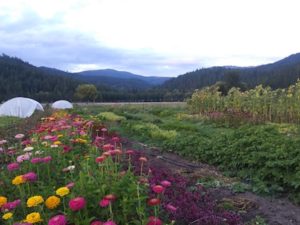The 2020 FruitGuys Community Fund Grantees
- By The FruitGuys Community Fund
- Reading Time: 7 mins.
During the COVID-19 crisis, small farms are showing once again just how essential they are to keeping our local communities fed, healthy, and functioning. The FruitGuys Community Fund is excited to announce the 2020 grantees chosen to receive grants up to $5,000 for sustainability projects that will reduce power use, increase yields, conserve water and soil, and promote pollinators.
A volunteer grant committee selected 15 farms and agricultural nonprofits from 14 different states to receive a total of $51,098.87 in funding, provided 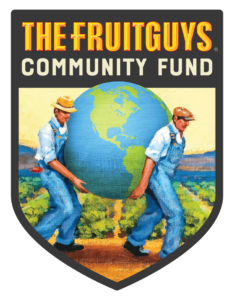 thanks to the generous supporters of the Give & Grow Good 2020 campaign. A majority of funds were directed to those farmers most vulnerable during this time, including farmers of color, women farmers, and farmers who are veterans. Of the 2020 grantees, 80% are women and/or persons of color-owned or managed. Additionally, 14 out of 15 grantees are actively increasing low-income food access and community food security, which will be needed more than ever during this crisis.
thanks to the generous supporters of the Give & Grow Good 2020 campaign. A majority of funds were directed to those farmers most vulnerable during this time, including farmers of color, women farmers, and farmers who are veterans. Of the 2020 grantees, 80% are women and/or persons of color-owned or managed. Additionally, 14 out of 15 grantees are actively increasing low-income food access and community food security, which will be needed more than ever during this crisis.
“Small American farms are key to a healthy food system, economic self-sufficiency, sustainability, and food access and they need support more than ever to continue to feed our communities and keep us healthy,” said Chris Mittelstaedt, project director for The FruitGuys Community Fund and founder and CEO of The FruitGuys. “We are humbled to continue to provide this critical funding and grateful that none of the selected farms foresaw any additional challenges to completing their sustainability projects this year due to the effects of COVID-19.”
Because of the increased financial stress caused by the COVID-19 crisis, the Fund changed its funding disbursement process and have awarded the full grant in a single installment. All previous grants were awarded in two installments: the first, equaling 75% of the grant awarded, in April; and the remaining 25% of funds dispersed in December, following successful completion of the project and submission of a final progress report.
Thankfully none of the selected farms foresaw any additional challenges to completing their sustainability projects this year due to the effects of the pandemic.
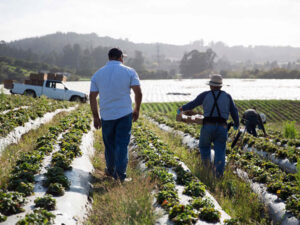
The FruitGuys Community Fund Impact 2012-2020:
84 Farms
30 States
$326K+ Funded
1,256 Acres stewarded
83% Women and/or person of color-owned farms
66% Family-owned farms
90% Increasing low-income food access
98% Beginning Farmers
In its eighth year of grant giving, the fund continues to provide small grants (up to $5,000) to small farms and agricultural nonprofits for sustainability projects that have large positive impacts on the environment, local food systems, and farm diversity. You can read the stories of past grantees here. If you’d like to join the FruitGuys in supporting small farms, please consider donating to the Community Fund.”
The Class of 2020 Grantees
Sicangu Community Development (Keya Wakpala Gardens) ― Mission, South Dakota
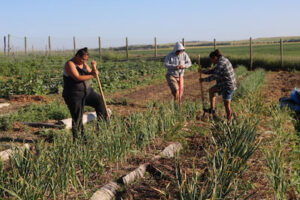
Keya Wakpala Gardens is a 1-acre agricultural nonprofit organization in Mission, SD, that produces a wide range of vegetables, as well as eggs and honey. Their products are distributed at local farmers markets and across the Rosebud Indian Reservation, thanks to their mobile market units. Excess produce is donated to different programs on the reservation, such as the Commodity Supplemental Food program, the Tree of Life Ministry, and the Adult Corrections Facility. Their goal is to teach interns and community members how to become producers. Their $2,519 grant will allow them to purchase fruit trees, shrubs, a chipper/shredder, cover crop seeds, and a tilther tool. They’ll use these supplies to transition to a no-till agriculture model and provide fruit to an area that’s considered a food desert.
Coffee Pot Farms ― Winslow, Arizona
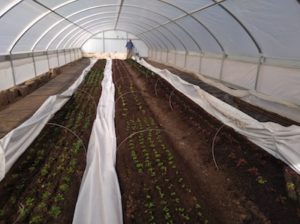 Coffee Pot Farms is a 1-acre farm located in the Navajo Nation in Winslow, AZ, that grows greens, tomatoes, peppers, other vegetables, and seedlings. Their $5,000 grant will allow them to install a solar-power system and renovate a building into a post-harvest cold storage room. Having power and cold storage in this off-the-grid desert area will reduce crop losses and food waste, improve food safety, diversify farming options, and expand their market possibilities.
Coffee Pot Farms is a 1-acre farm located in the Navajo Nation in Winslow, AZ, that grows greens, tomatoes, peppers, other vegetables, and seedlings. Their $5,000 grant will allow them to install a solar-power system and renovate a building into a post-harvest cold storage room. Having power and cold storage in this off-the-grid desert area will reduce crop losses and food waste, improve food safety, diversify farming options, and expand their market possibilities.
Kansas City Community Gardens (The Giving Grove) ― Kansas City, MO
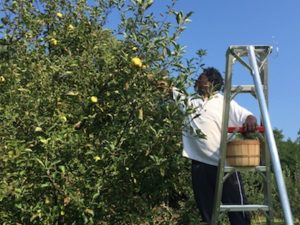 The Giving Grove is an agricultural nonprofit in Kansas City, MO, in conjunction with Kansas City Community Gardens. It establishes and supports orchards in low-income neighborhoods, by partnering with local nonprofits, communities of faith, and health agencies. Fruit from 176 orchards is made freely available to the local community or donated to food pantries. Their $3,015 grant will allow them to build and install Japanese beetle traps, designed by the University of Missouri, to protect their orchards from this destructive pest.
The Giving Grove is an agricultural nonprofit in Kansas City, MO, in conjunction with Kansas City Community Gardens. It establishes and supports orchards in low-income neighborhoods, by partnering with local nonprofits, communities of faith, and health agencies. Fruit from 176 orchards is made freely available to the local community or donated to food pantries. Their $3,015 grant will allow them to build and install Japanese beetle traps, designed by the University of Missouri, to protect their orchards from this destructive pest.
Mick Klug Farm ― St. Joseph, Michigan
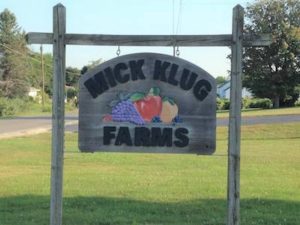
Mick Klug Farm is a 120-acre farm in St. Joseph, MI, that grows and provides more than 30 varieties of fruit and vegetable crops to Chicago-area markets, restaurants, breweries, and small grocery outlets. Their $4,865 grant will allow them to establish hedgerows of native plants throughout the property, which will help support resident honeybee and beneficial insect populations and increase pollination.
Blue Yonder Organic Farm ― North Salem, Indiana 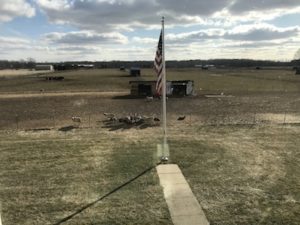
Blue Yonder Organic Farm is a 20-acre farm in North Salem, IN, that produces organic, pastured meats, eggs, shiitake mushrooms, honey, maple syrup, vegetables, berries, apples, and asian pears that are sold through farmers markets and their online store. They received a $4,040 grant to purchase wildflower and herb seeds, bird houses, and protective fencing. They will plant a mixed-pollinator and medicinal-herb understory as a part of a new 16-acre hedgerow system, creating a sustainable farming demonstration site within a community of conventional corn and soybean farms.
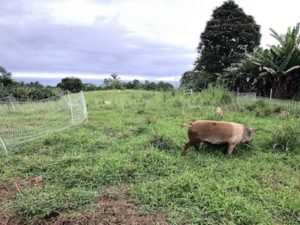 Sugar Hill Farmstead ― Hilo, Hawaii
Sugar Hill Farmstead ― Hilo, Hawaii
Sugar Hill Farmstead is a 10-acre farm in Hilo, HI, that produces pastured meats and eggs, raw honey, and organic bananas. Their livestock supplies the only meat CSA available on the Big Island. The bananas are sold to a local smoothie shop or dehydrated and sold at another farm store. Their $4,351 grant will allow them to purchase two windmills, which they’ll add to their current solar-power system, decreasing their reliance on generators and further reducing their fossil fuel consumption.
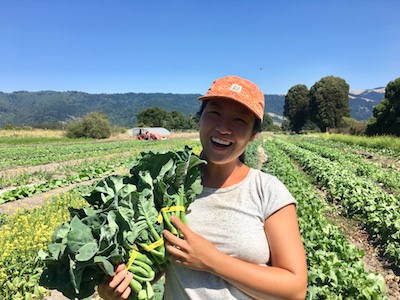 Shao Shan Farm ― Bolinas, California
Shao Shan Farm ― Bolinas, California
Shao Shan Farm is a 5-acre farm in Bolinas, CA, that grows organic Asian heritage vegetables which are sold to chefs, farmers markets, grocery stores, and communities. They also donate produce to their local “Free Food Fridays” food pantries, senior dinner programs, and bi-weekly gleanings. They received a $4,881 grant that will allow them to purchase a rotary mower and hoop house. The mower will help them manage their cover crops, and their hoop house will allow them to grow more heat-loving crops in the cool coastal environment.
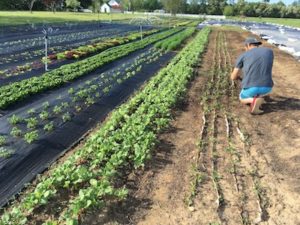 Seafield Farm ― Cape Charles, Virginia
Seafield Farm ― Cape Charles, Virginia
Seafield Farm is a 1-acre farm in Cape Charles, VA, that grows a wide variety of vegetables, herbs, flowers, and pecans, as well as producing eggs and honey. Their $2,090 grant will allow them to install drip irrigation and two hydrant water spigots on their farm. These improvements will save water and electricity.
Dry Creek Farm ― Tahlequah, Oklahoma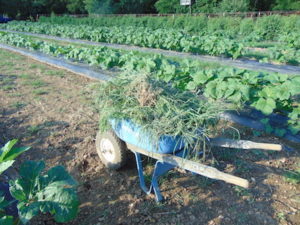
Dry Creek Farm is a 1-acre farm in Tahlequah, OK, that sells certified organic produce at their local farmers market and through a farm-to-school program. Their $2,012 grant will help them convert hog pasture into an orchard and vineyard. This transition will help reduce erosion, provide pollinator habitat, diversify their farm income, and allow them to provide educational opportunities.
Thompson Creek Farm ― Newman Lake, Washington
Thompson Creek Farm is a 2-acre farm in Newman Lake, WA, that grows a wide variety of vegetables, berries, and fruit, which they sell through a CSA and to local farmers markets and restaurants. Their $3,592 grant will allow them to purchase owl and bat boxes for natural pest management, as well as a hoop house to extend their growing season.
Bittersweet Farm ― Heuvelton, New York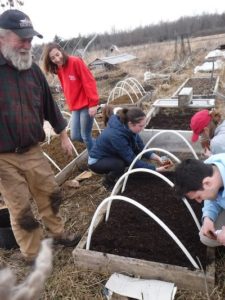
Bittersweet Farm is a 80-acre farm in Heuvelton, NY, that grows transplants, perennial plants, cut flowers, vegetables, herbs, tree fruits, berries, and nuts. They also raise Scotch Highland cattle, St. Croix sheep, Tamworth hogs, and heritage chickens. They sell their goods at farmers markets and food stores, to local restaurants and their local university. Last year, they started their Weekend Workshare Program, where community members can work with them to earn the equivalent of $15 per hour in food. Their program goal is to teach farming skills and increase local food access for low-income families. They received a $2,775 grant to expand this program by extending their growing area to include berries, vegetables, herbs, and flowers, and to purchase tools, boots, and gloves for Workshare members to use.
Comeback Orchards ― Asbury, New Jersey
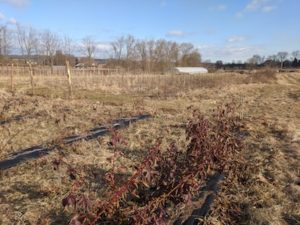
Comeback Orchards is a 10-acre farm in Asbury, NJ, that grows organic fruit, including apples, pears, Asian pears, plums, apricots, cherries, peaches, and nectarines, as well as organic vegetables, which they sell primarily at farmers markets. Their $3,116 grant will allow them to diversify their orchard and support local pollinators by planting heirloom blueberry plants, establishing local Blue Orchard Mason bee colonies, and adding other pollinator plantings.
Hollyaire Farm ― Junction City, Oregon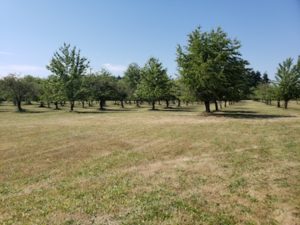
Hollyaire Farm is a 40-acre farm in Junction City, OR, that produces a wide variety of fruits, vegetables, herbs, and eggs, which they sell at their farmstand, as well as wholesale to other local farms and businesses. They received a $3,650 grant to purchase two high tunnels to increase their production, as well as adding 50 fruit trees to their orchard, and installing bee, bat, and owl boxes for natural pest control and pollination.
Rancho Charanda ― Redlands, California
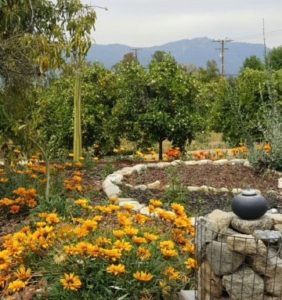
Rancho Charanda is a 3-acre farm in Redlands, CA, that grows oranges, tangerines, lemons, avocados, sugarcane, chile peppers, and a wide variety of native foods, such as cactus paddles, prickly pear, xoconostle, and cholla. Their $3,198 grant will allow them to purchase a water storage tank and replace their outdated drip irrigation system.
Frecon Fruit Farms ― Boyertown, Pennsylvania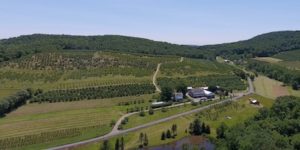
Frecon Fruit Farms Inc. is a 75-acre farm in Boyertown, PA, that produces a wide variety of fruit. They sell to farmers markets, small retailers, local schools, hospitals, food banks, and The FruitGuys. They received a $1,991 grant to help complete a deer fencing project that will help reduce damage to their orchards from the growing population of white-tailed deer in their area.
Grantees will provide regular informal project updates, as well as submitting a formal progress report in December detailing their project’s completion. We look forward to seeing their projects realized and hearing stories about the impacts on their farms and their communities.
If you’d like to keep up with these farms throughout the year, be sure to sign up for The FruitGuys Community Fund newsletter. Support small farms like these by donating to our Give & Grow 2021 Campaign. 100% of your donation goes to deserving farms like the grantees of 2020.
